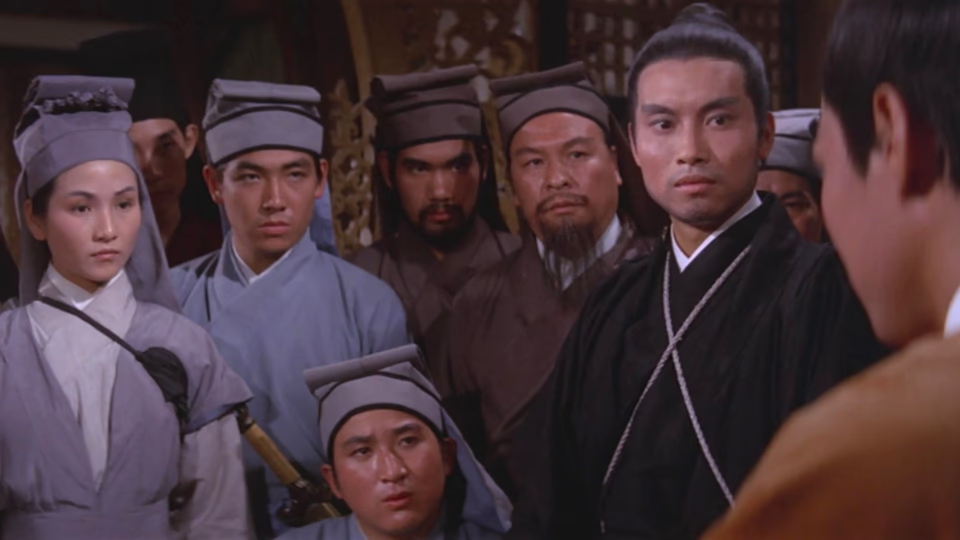Dragon Swamp

Dragon Swamp’s reach exceeds its grasp, but it still proves an entertaining ride.
That said, it does not start well.
The cold open sees a group of monks arrive at the small house of Tang Dachuan, who’s stolen the cursed Jade Dragon Sword. Dachuan tries to fight them off but soon realizes he can’t win and flees with his toddler son. Then his wife, Fan Ying, played by Pei-Pei Cheng, emerges holding her infant daughter. She’s in shock, unaware her husband had stolen the sword and stunned he fled with their son.
The master monk informs her of the penalty for stealing the sword: twenty years exile in Dragon Swamp, a seemingly magical place full of grave dangers. She accepts her punishment, gives the master her infant daughter to raise, and sets out in a small canoe as epic choral music fills the soundtrack.
A fair-enough setup, but the execution disappoints. The matte painting backdrops are blatantly obvious. Like high school play obvious. This continues to the scene where Fan Ying boards her canoe, in what’s clearly a soundstage pool bordered by more obvious backdrops. She can’t even row away—the pool’s too small—so she rows behind the matte backdrop. Look closely and you can see the canoe’s tail sticking out. Fortunately, the fight choreography, while not amazing, at least looks professional.
The low production values continue as the story fast-forwards twenty years. We get a blatant miniature exterior shot of the temple where Fan Ying’s daughter, Qing-erh, is a grown woman, also played by Cheng. The sword is once again stolen, and Qing-erh sets out to retrieve it.
Despite the early reliance on soundstage sets, Qing-erh’s quest makes terrific use of outdoor locales, but proves wildly uneven in terms of its special effects. She heads to Dragon Swamp to ask the mysterious Dragon Swamp Master for aid. More shots of the backdrop-bound pool, and then some cringe-worthy rear-projection shots of fish and lizards blown up to gigantic sizes. But then, when Qing-erh meets Fan Ying, the split screen effects where Cheng plays opposite herself shine. (The film wisely avoids age makeup for Cheng as Fan Ying, instead explaining her youth as coming from a potion made from dragon’s gallbladder and saliva.)
This dichotomy continues to the fight sequences, which grow increasingly savage. We get assorted skewerings and slashings and even a scene where a thrown plate lodges inside a man’s skull. These scenes thrill, but the swords are all dull grey, clearly painted props.
Fortunately, Cheng’s dual performance compensates. As Fan Ying, she’s a world-weary mother. Her initial scenes with Qing-erh best evoke the pathos the film aspires to, as the two embrace and we see Fan Ying’s face, on the verge of tears.
As Qing-erh, Cheng crafts a distinct, whimsical personality full of vivacious charm. A highlight comes with a scene where she’s seated in an inn, weary from a long day’s ride. She orders food and as she waits, four assassins enter. First, a woodsman, who throws his axe across the room, cutting off a chunk of meat, then, before it hits the ground, retracts it via an attached chain. Then, a fisherman who plants his pole into the inn’s wooden floor inches deep. Finally, the brute, who slams his pan down onto Qing-erh’s table so hard, the waiter can’t dislodge it.
Qing-erh reacts to each of these displays with a knowing smile. As the tension mounts, she whirls her tea cup on the table, all while grinning mischievously. It’s a terrifically charismatic display that simultaneously amplifies the tension while winning over the audience. A beating is about to commence but she knows—and we know—she won’t be on the receiving end. When the battle ensues, the choreography doesn’t disappoint.
Indeed, unlike the opening’s merely adequate choreography, later scenes shine. When Qing-erh first confronts the sword thief, she finds herself outnumbered, surrounded by dozens of men. Director Wei Lo pulls back the camera as the men move in rings around her, each ring moving in lockstep, while the rings themselves move in opposite directions. It’s an arresting bit of choreography.
In contrast to that ordered display, the final battle royal is a chaotic melee with dozens of warriors slashing, stabbing, and jumping. It proves equally arresting, as Wei Lo fills every bit of the screen with kinetic action.
The finale bookends the opening exile sequence and you realize the film was reaching for an epic, hero’s journey pathos for Fan Ying. It falls short, introducing too many characters and requiring some contrived death’s door reversals to achieve its ends. This, combined with the uneven production values, keep it from greatness. But one can appreciate the ambition. It shot for the moon, but landed among the stars.